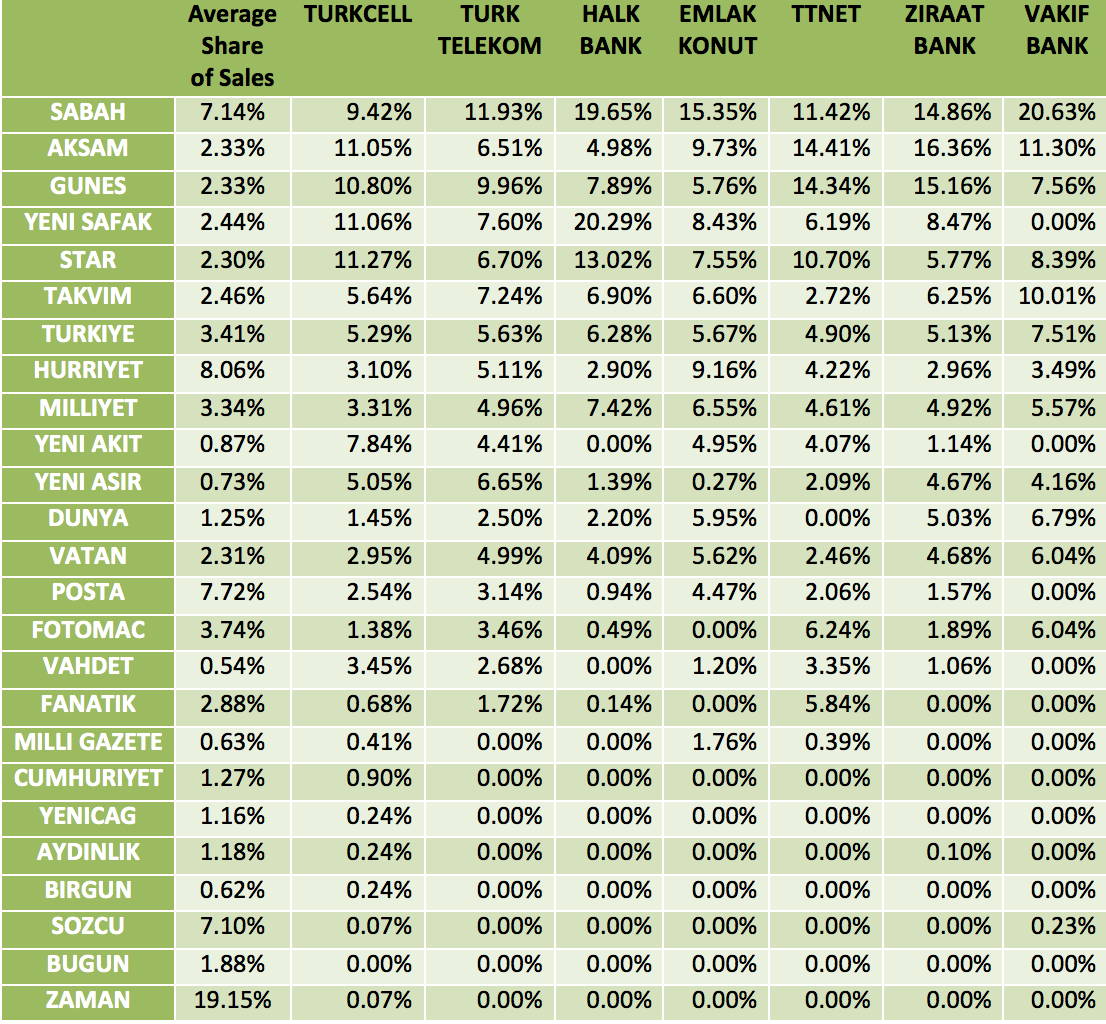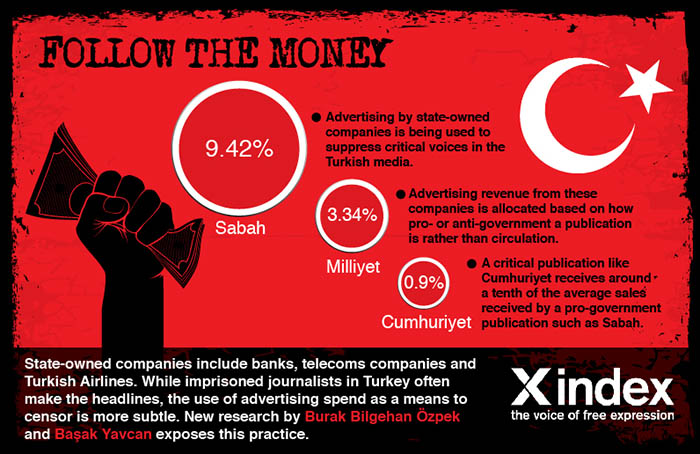[vc_row][vc_column][vc_custom_heading text=”Imprisoned journalists make headlines, but the Turkish government has a more insidious method for controlling the media, researchers BURAK BILGEHAN ÖZPEK and BAŞAK YAVCAN argue in an unpublished report excerpted in the winter edition of Index on Censorship magazine” font_container=”tag:p|font_size:24|text_align:left” google_fonts=”font_family:Libre%20Baskerville%3Aregular%2Citalic%2C700|font_style:400%20italic%3A400%3Aitalic”][/vc_column][/vc_row][vc_row full_width=”stretch_row_content_no_spaces”][vc_column][vc_single_image image=”84920″ img_size=”full” alignment=”center”][/vc_column][/vc_row][vc_row][vc_column][vc_column_text]
Advertising is the latest way for the Turkish government to lean on the media to stop critical stories going into the press, according to unpublished research.
The large advertising budgets of state-controlled Turkish industries like banks, telecoms companies and Turkish Airlines are being used by the government to develop a financial grip over newspapers and control what they report.
Patterns of advertising during 2015 suggest that newspapers which do not toe the government line, or are hostile, are being starved of those revenues.
For instance, Sabah, a newspaper particularly sympathetic to the government, received more than 20% of the advertising budget of the state-controlled bank Halk Bank, while the independent Hürriyet received only 2.9%, despite both having a similar circulation.
Government-controlled telecoms company Turkcell also favoured Sabah by giving it 9.4% of its advertising, while Hürriyet took just 3.1%.
The situation was similar for another state-controlled telecoms company, Turk Telekom: Sabah received more than twice Hürriyet’s share of their total advertising.
Their research found that any paper critical of the government – those associated with the social democratic movement, liberalism, Kemalism, nationalism, Islamism – was either discriminated against, or excluded entirely, when it came to crucial advertising revenue.

Table: Daily newspapers’ share of advertising from part-public firms in 2015
[/vc_column_text][/vc_column][/vc_row][vc_row][vc_column][vc_column_text]
Burak Bilgehan Özpek is an associate professor and Başak Yavcan is an assistant professor in the department of political science and international relations at TOBB University of Economics and Technology in Ankara. This is an extract of their article from the winter 2016 issue of Index on Censorship magazine, which is based on their as-yet unpublished research into press freedom in Turkey. The magazine article can be read in full for free on Sage Journals until 31 January 2017.
[/vc_column_text][/vc_column][/vc_row][vc_row][vc_column width=”1/3″][vc_custom_heading text=”Fashion Rules” font_container=”tag:p|font_size:24|text_align:left” link=”url:https%3A%2F%2Fwww.indexoncensorship.org%2F2016%2F12%2Ffashion-rules%2F|||”][vc_column_text]The winter 2016 issue of Index on Censorship magazine looks at fashion and how people both express freedom through what they wear.
In the issue: interviews with Lily Cole, Paulo Scott and Daphne Selfe, articles by novelists Linda Grant and Maggie Alderson plus Eliza Vitri Handayani on why punks are persecuted in Indonesia.[/vc_column_text][/vc_column][vc_column width=”1/3″][vc_single_image image=”82377″ img_size=”medium” alignment=”center” onclick=”custom_link” link=”http://www.indexoncensorship.org/2016/12/fashion-rules/”][/vc_column][vc_column width=”1/3″][vc_custom_heading text=”Subscribe” font_container=”tag:p|font_size:24|text_align:left” link=”url:https%3A%2F%2Fwww.indexoncensorship.org%2Fsubscribe%2F|||”][vc_column_text]In print, online. In your mailbox, on your iPad.
Subscription options from £18.
Every subscriber helps support Index on Censorship’s projects around the world.
![]() SUBSCRIBE NOW[/vc_column_text][/vc_column][/vc_row]
SUBSCRIBE NOW[/vc_column_text][/vc_column][/vc_row]













